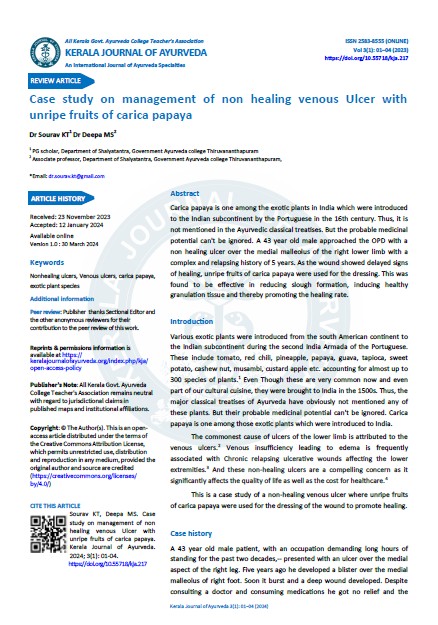Case study on management of non healing venous Ulcer with unripe fruits of carica papaya
DOI:
https://doi.org/10.55718/kja.217Keywords:
Non healing ulcers, Venous ulcers, carica papaya, exotic plant speciesAbstract
Carica papaya is one among the exotic plants in India which were introduced to the Indian subcontinent by the Portuguese in the 16th century. Thus, it is not mentioned in the Ayurvedic classical treatises. But the probable medicinal potential can't be ignored. A 43 year old male approached the OPD with a non healing ulcer over the medial malleolus of the right lower limb with a complex and relapsing history of 5 years. As the wound showed delayed signs of healing, unripe fruits of carica papaya were used for the dressing. This was found to be effective in reducing slough formation, inducing healthy granulation tissue and thereby promoting the healing rate
References
Abraham T, Mitra M. Eating with history: Ancient Trade influenced cuisines of Kerala. Niyogi Books; 2020.
Das S. chapter 11.ULCER, SINUS AND FISTULA. In: A concise textbook of surgery. 6th ed. Dr S. Das; 2010. p. 159.
Yildiz CE, Conkbayir C, Tolgay HE, Ceviker K, Canikoglu M, Sayin OA, Ugurlucan M. Successful treatment of a 20-year nonhealing venous leg ulcer in a patient with systemic lupus erythematosus. Arch Med Sci. 2017 Apr 1;13(3):691-695. doi: 10.5114/aoms.2017.67289. Epub 2017 Apr 20. PMID: 28507589; PMCID: PMC5420642.
Nair HK. Non-healing venous leg ulcer. Journal of Wound Care. 2020;29(Sup5b). doi:10.12968/jowc.2020.29.sup5b.s26
[Internet]. [cited 2023 Aug 11]. Available from: https://downloads.hindawi.com/journals/ecam/2011/251850.f1.pdf
Acharya Susruta – Susruta Samhita with Nibandha sangraha commentary by Dalhana, Edited by Vaidya Jadavji Trikamji Trikamji Acharya and the rest by Narayana Ram Acharya Kavyatirtha, Published by Choukambha Orientalia, Varanasi, Reprint Edition : 2017, Sutra Sthana 5/17
Chandra P, J GB, Pathak A, P HK. Effect of Hingulamrutadi Malahara in the management of Dushta Vrana. International Journal of Ayurvedic Medicine. 2013;4(2). doi:10.47552/ijam.v4i2.283
Acharya Susruta – Susruta Samhita with Nibandha sangraha commentary by Dalhana, Edited by Vaidya Jadavji Trikamji Trikamji Acharya and the rest by Narayana Ram Acharya Kavyatirtha, Published by Choukambha Orientalia, Varanasi, Reprint Edition : 2017, Sutra Sthana 22/7
In: Indian medicinal plants. 2005th ed. Vol 1. Orient Longman; 1994. p. 383–5.
Nayak BS, Pereira LP, Maharaj D. Wound healing activity of Carica papaya L.in experimentally induced diabetic rats. Indian J Exp Biol. 2007;45:739–43.
Collier M. Wound-bed preparation. [Last accessed on 2012 Feb 24];Nursingtimes.net. 2002 98:55. Available from: http://www.nursingtimes.net/nursing-practice-clinical-research/wound-bedpreparation/200408.article .
Pieper B, Caliri MH. Nontraditional wound care: A review of the evidence for the use of sugar, papaya/papain, and fatty acids. J Wound Ostomy Continence Nurs. 2003;30:175–83.
Emeruwa AC. Antibacterial substance from Carica papaya fruit extract. J Nat Prod. 1982;45:123–7.





